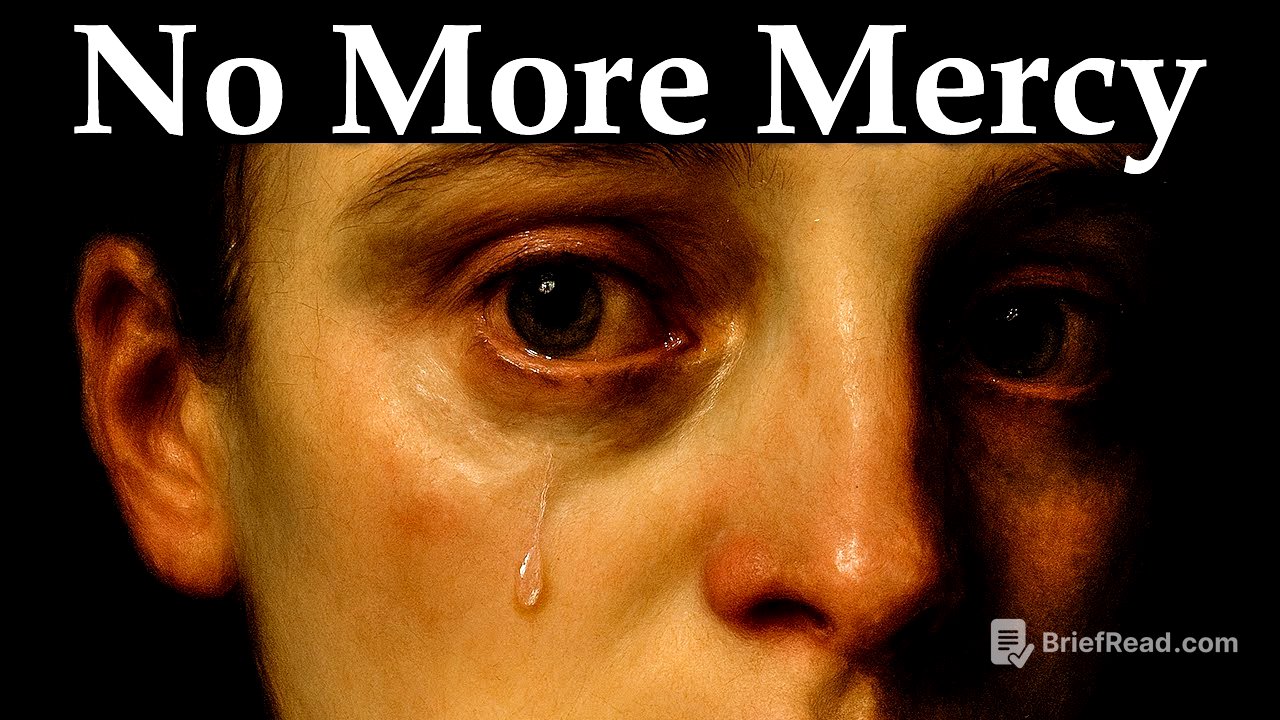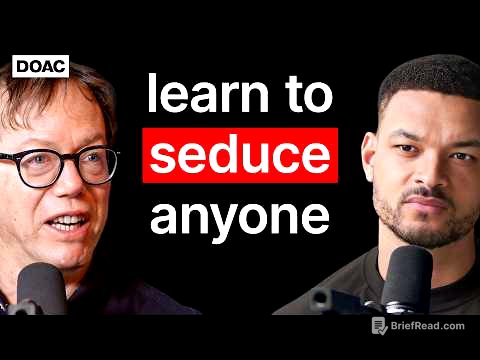TLDR;
This video discusses how society and personal habits contribute to a sense of weakness, which is defined not as the absence of strength, but as self-betrayal. It challenges viewers to confront and reject societal conditioning, reclaim their inherent strength, and live authentically. The video emphasizes the importance of solitude, decisiveness, and redefining personal narratives to overcome victimhood and embrace a powerful, self-defined existence.
- Weakness is self-betrayal, not lack of strength.
- Societal training and habits reinforce weakness.
- Overcoming weakness requires rejecting societal norms and embracing authenticity.
- Solitude, decisiveness, and redefining personal narratives are key to reclaiming power.
Introduction: Erasing Weakness [0:07]
The speaker introduces the idea of erasing weakness by revealing it as an illusion created by self-deception. This isn't about motivation or inspiration, but about recognizing the inherent strength already present, buried beneath layers of self-doubt and societal conditioning. The message is for those ready to confront life's challenges and stop waiting for external validation or rescue. The aim is to help the viewer return to their true self, shedding the passivity and emotional inflation that have led to invisibility.
Defining Weakness [2:07]
The speaker defines weakness not as emotional expression or physical attributes, but as emotional submission, dependence on external validation, and choosing comfort over truth. Weakness is identified as self-betrayal, fostered by a world that trains obedience and conformity. Societal structures and even well-meaning individuals often benefit from and encourage weakness, keeping individuals predictable and dependent. The speaker quotes Nietzsche, emphasizing the individual's struggle against being overwhelmed by the tribe, urging listeners to stay true to their instincts and remain dangerous in a world that demands conformity.
Reclaiming Strength: Rejecting Societal Norms [4:32]
The initial step in eliminating weakness involves recognizing that society has conditioned individuals to mistake weakness for goodness. This includes the belief that asserting boundaries is selfish and choosing oneself is narcissistic. True strength, which attracts respect and leaves a lasting impression, arises from rejecting mass thinking, safety, and the need for approval. The speaker prompts the audience to consider who they would be without the need to be liked, urging them to remove their filters and stop editing themselves. The speaker argues that suppressing one's true self leads to resentment and fatigue, which is the cost of weakness.
Habits and Weakness [7:22]
Weakness is perpetuated through daily routines that erode willpower. The speaker quotes Nietzsche: "He who cannot obey himself will be commanded." Starting the day by checking one's phone is presented as surrendering control and weakening sovereignty. The speaker advises owning one's mornings by focusing on posture and breath, and remembering that one is a creator, not just a consumer. Weakness also manifests in speech, such as softening one's words, apologizing unnecessarily, and expressing uncertainty. Clarity is presented as a force that commands attention, and the speaker encourages owning one's opinions and allowing silence to carry weight.
Emotional Command and Victimhood [10:09]
Strength is not about feeling nothing, but about emotional command, choosing one's actions rather than reacting impulsively. Discipline is essential, differentiating purposeful emotion from uncontrolled outbursts. Nietzsche viewed victimhood as a form of psychological slavery, characterized by blaming others and using trauma to justify stagnation. The speaker urges listeners to stop portraying their stories as tragedies and instead transmute pain into strength. The focus should be on what one becomes despite their experiences, turning scars into armor.
Choosing Your "Why" [12:31]
The speaker emphasizes that having a purpose ("why") is essential for enduring hardship, quoting Nietzsche: "He who has a why to live can bear almost any how." This "why" is not found but chosen, carved into one's daily life. Deciding on a clear direction dissolves weakness by eliminating distractions and doubt. The speaker urges the audience to define what they serve, build, and protect, and what they will no longer tolerate. This decision must be written down and made non-negotiable to avoid the world assigning a weak purpose.
The Fear of Being Alone [14:12]
The speaker addresses the fear of being alone as a root of weakness. The desire to belong leads to suppressing one's true self to gain acceptance. Nietzsche believed that one must be willing to stand alone to truly know oneself. Belonging often comes at the cost of authenticity and individuality. The speaker encourages unlearning the addiction to belonging and building one's own table, finding clarity and space in solitude.
Breaking Psychological Contracts [17:00]
Procrastination and self-sabotage are not due to laziness but to hidden loyalties and psychological contracts made to stay small and avoid making others uncomfortable. The speaker urges breaking these contracts, as one is meant to be felt and requires intensity and decisiveness. Quoting Nietzsche, "The snake which cannot cast its skin must die," the speaker equates weakness with the refusal to evolve. The speaker encourages shedding the old skin of people-pleasing and overthinking.
Tactical Steps to Erase Weakness [18:50]
Practical steps to eliminate weakness include modifying language to speak clearly and avoid softening or qualifying statements. The speaker advises owning one's opinions without excessive explanation and being comfortable with the silence that follows. Body language is also crucial; one should stand and move with certainty and presence. The speaker emphasizes the importance of aligning with deeply held beliefs and living by them.
Killing Victimhood and Embracing Power [20:41]
The speaker denounces the glorification of suffering and urges listeners to rewrite their narratives, transforming pain into power. Instead of identifying as a trauma survivor, one should identify as a builder of fire. The speaker emphasizes that words are spells and should be used to speak power or remain silent. The video concludes by reminding the viewer that they already possess the knowledge and strength to overcome weakness, urging them to evolve and become the person Nietzsche would respect—the most real version of themselves.









